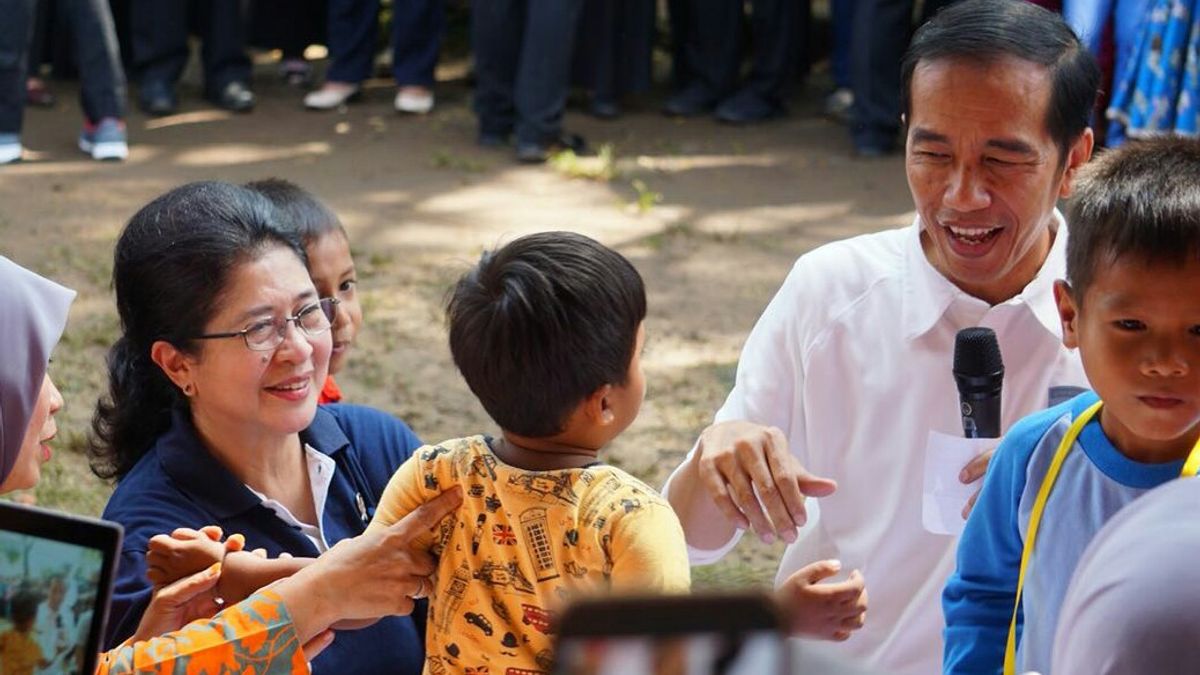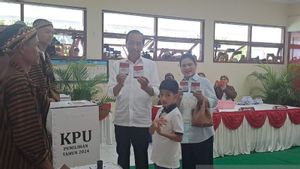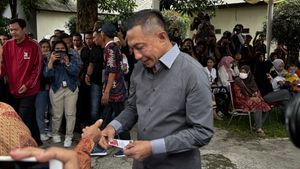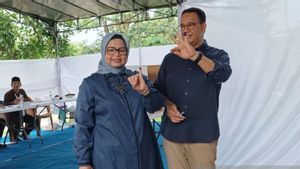JAKARTA - The results of the Indonesia Nutrition Status Survey (SSGI) in 2021 by the Ministry of Health stated that the stunting prevalence rate in Indonesia in 2021 was progressing. The percentage decreased by 6.4 percent, from 30.8 percent in 2018 to 24.4 percent in 2021.
This year, Vice President KH Ma'ruf Amin is even optimistic that the prevalence of stunting can decrease to 3 percent. Thus, the government's target of reducing the prevalence to 14 percent in 2024 is more easily realized.
“Of course this is a challenge for all of us to achieve it. Program implementation must be monitored, evaluated and reported in an integrated and periodic manner. So we can know the progress, achievements, and obstacles faced in its implementation, which then we can take the next step to ensure the prevalence target of 14% by 2024 can be achieved," said Ma'ruf Amin while chairing the Coordination Meeting of the Team for the Acceleration of Stunting Reduction (TPPS) on May 11, 2022.
The Vice President as the Chair of the TPPS Steering Team requested that the National Action Plan for Reducing Stunting Rates in Indonesia (RAN PASTI) also focus on the provinces of East Nusa Tenggara, West Sulawesi, Aceh, West Kalimantan, South Kalimantan, Central Sulawesi, and West Nusa Tenggara.

Vice President Ma'ruf Amin as the Chair of the TPPS Steering Team asked that the National Action Plan for Reducing Stunting Rates in Indonesia (RAN PASTI) also focus on areas with a high prevalence of stunting. (Between)
Because, from the results of the 2021 SSGI, the prevalence rate in these areas is still high above 30 percent. NTT 37.8 percent, West Sulawesi 33.8 percent, Aceh 33.2 percent, NTB 31.4 percent, Southeast Sulawesi 30.2 percent, and South Kalimantan 30 percent.
"In addition, to areas with a high number of stunting children through more intensive interventions, such as West Java, East Java, Central Java, Banten, and North Sumatra," Ma'ruf Amin asked.
Stunting is one of the indicators of failure to thrive in toddlers due to chronic nutritional deficiency in the first 1,000 days of life, from the child is still in the form of a fetus to the age of 23 months.
Boost the Target of Exclusive BreastfeedingOne of the efforts to reduce the prevalence of stunting is of course exclusive breastfeeding. Various studies have proven that breast milk is the first immunization for infants, preventing disease and preventing infant mortality.
According to the Head of the IDAI ASI Task Force, Dr. dr. Naomi Esthernita F. Dewanto, in addition to containing essential nutrients needed by babies, breast milk contains immunoglobulins that strengthen the local immune system of the gastrointestinal tract as well as other components that have a protective effect.
"Immunoglobulins contained in breast milk are the body's first defense for babies. With the creation of an immune system, stunting can be overcome,” said Naomi at the Indonesian Pediatrician Association Media Seminar in the context of World Breastfeeding Week 2022 entitled 'Step Up for Breastfeeding: Educate and Support', Saturday (6/8).
Not only for babies, exclusive breastfeeding for at least six months is also beneficial for the mother. By breastfeeding, mothers can avoid the risk of cancer, reduce the risk of bleeding, and reduce contractions.

"It can also reduce postpartum depression so that it can reduce the number of suicides," he continued.
Unfortunately, exclusive breastfeeding in Indonesia is still relatively low. Data from the Central Statistics Agency in 2021 stated that no province has yet reached 72 percent. In fact, some provinces are still at around 50 percent. Such as, Gorontalo, Central Kalimantan, North Sumatra, West Papua, and the Riau Islands.
Then, South Kalimantan, North Sulawesi, Maluku, Southeast Sulawesi, Bangka Belitung, DKI Jakarta, North Maluku, Aceh, Bengkulu, Bali and South Sumatra are still around 60 percent.
"Joint responsibility for the low rate of breastfeeding is still lacking, usually we just throw the responsibility only to the mother. Even though the mother for exclusive breastfeeding really needs support from the people around her," said Naomi.
This includes doctors, counsellors, policy makers, entrepreneurs, the media, and family members.
General Chairperson of the Central Executive Board of the Indonesian Pediatrician Association (IDAI) dr. Piprim Basarah Yanuarso, Sp.A(K) also asked doctors and health workers to campaign for exclusive breastfeeding for mothers who have just given birth.

Do not be directed to give formula milk. Moreover, during 2 days postpartum where breast milk is still difficult to come out.
"That's where the temptation starts. It's a pity that your baby has the heart to be a mother, later the baby will be fussy. If the mother understands, the doctor understands, the nurse understands, her husband understands, the grandmother understands. I will not be tempted (to give formula milk), because the baby for the first 24 hours and even the first two days can be without breast milk,” explained dr. Piprim in the same event.
"The key is the patience of all parties in the first days of the baby's life, because when the baby is immediately given formula milk, the baby is full. Now, if the baby is full, the suction is weak. just play there," dr. Piprim added.
As for the mother, it is better after giving birth to apply a healthy diet to smooth breastfeeding. Like, consuming 3 liters of water per day, regularly and eating protein and vegetables. It is also important to regulate the mental state so that the milk can come out better.
"The baby is fussy in the first days there is no milk, what do you do? Just leave it alone, cuddle it, pray for it so that the baby is calm. Everyone is calm. Wait for the play date, the milk will flow on its own on the third and fourth days," said dr. Piprim.
The Challenge of Realizing the 14 Percent TargetStunting certainly cannot be separated from the government's efforts to improve the welfare of its population. The target of 14 percent in 2024 may be difficult to achieve considering that the percentage of poor people after the COVID-19 pandemic continues to grow.
Currently, based on data from the Central Statistics Agency, the percentage of the number of poor people until March 2021 reaches 27.54 million people. Then, data from the Coordinating Minister for Human Development and Culture of Indonesia (PMK) 2019 states, there are 57 million underprivileged families, even the possibility of increasing post-pandemic.
Underprivileged families are groups that cannot fulfill one of the six basic family needs, such as the needs of clothing, food, housing, health, and education.
Launching from Kompas.com, the facilitator for the Ministry of Social Affairs, Mujiastuti, did not deny that the problem of poverty could be a stumbling block to the success of the program to reduce the prevalence of stunting.
However, not only that, the socio-cultural construction that exists in society must also be changed. There are still habits related to parenting and ways of life that are not appropriate in stunting prevention practices.

For example, prioritizing husbands or sons to consume highly nutritious foods over pregnant women or daughters.
Also, the habit of giving bananas as food for babies under the age of six months so that children are full and not fussy. In fact, during this period the best nutritional intake for infants is exclusive breastfeeding.
"Not to mention, access to quality information, and the lack of knowledge related to stunting prevention puts children from underprivileged families at risk of stunting," explained Mujiastuti.
These factors are a challenge, not only the government, but also the entire community.
Quoting President Jokowi's statement during the commemoration of the 2022 National Family Day, children are the determinants of Indonesia's future. If Indonesian children grow up healthy and smart, they can more easily compete with the next generation from other countries.
"But if our child is stunted, his nutrition is not good, his nutrition is not sufficient, and in the future it will be very difficult to compete with other countries. This is what I always remind you," said President Jokowi.
The English, Chinese, Japanese, Arabic, and French versions are automatically generated by the AI. So there may still be inaccuracies in translating, please always see Indonesian as our main language. (system supported by DigitalSiber.id)









